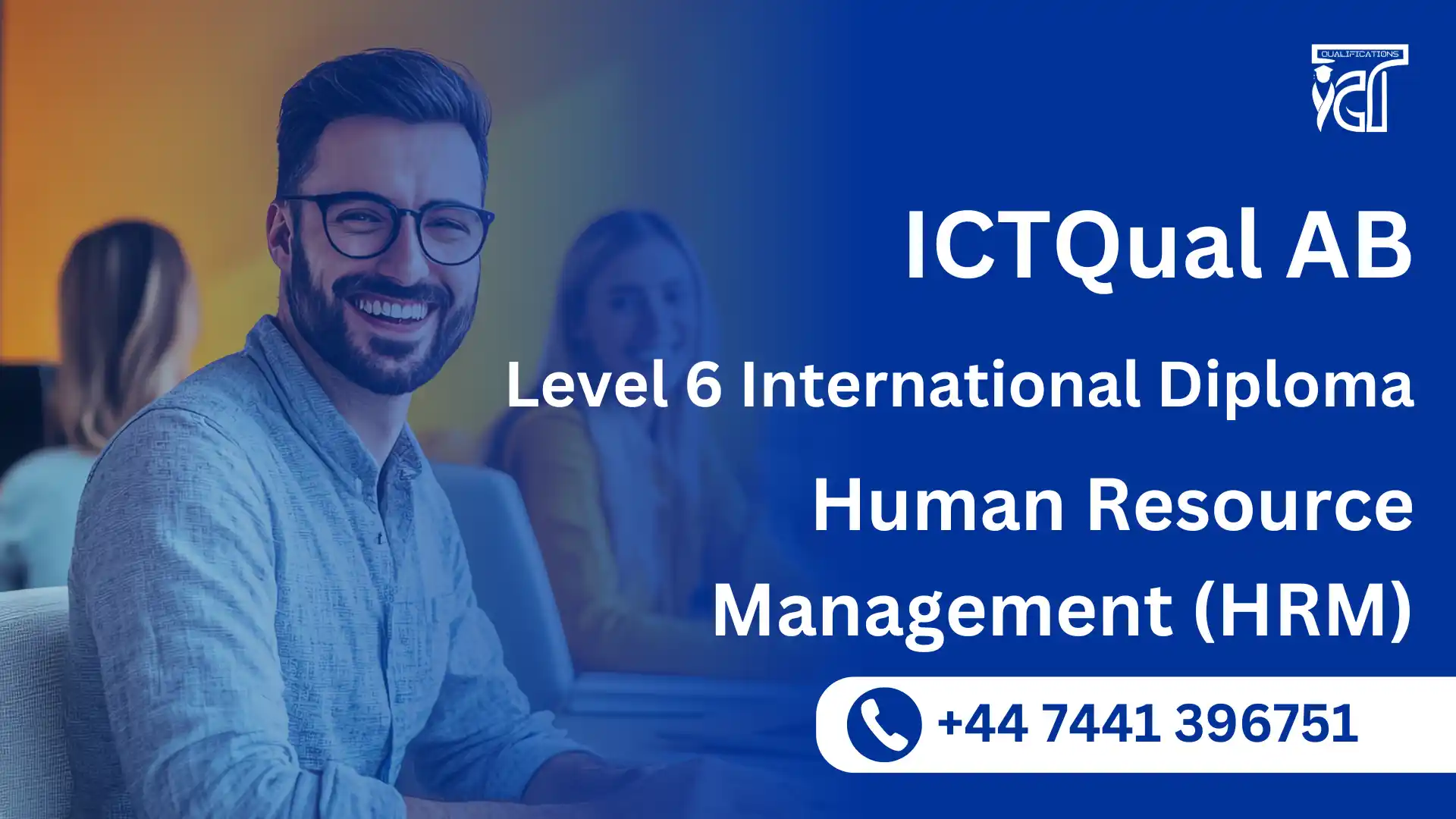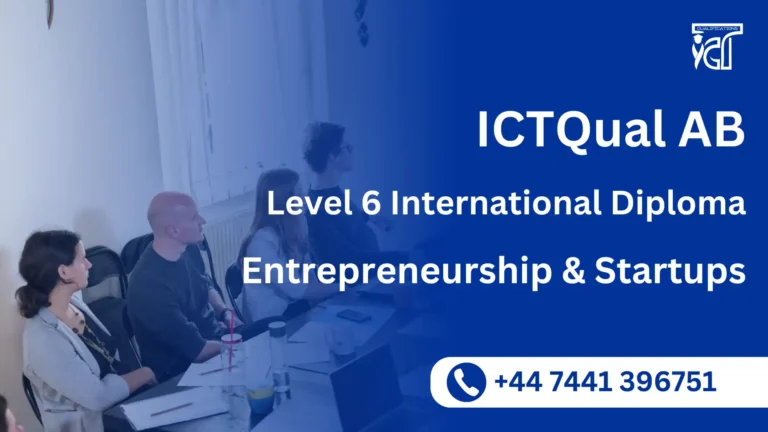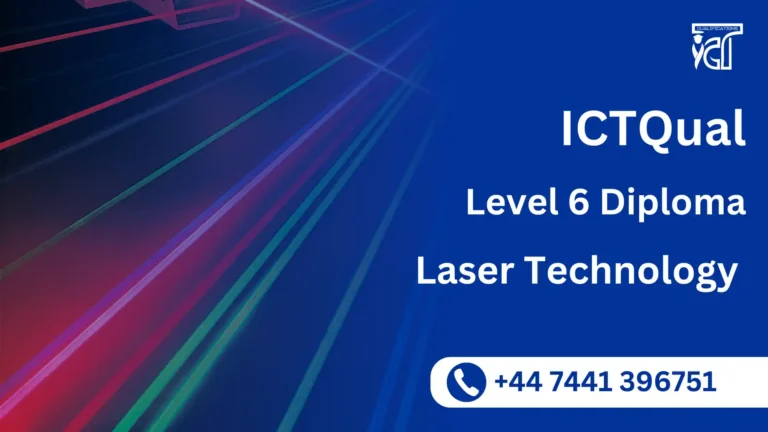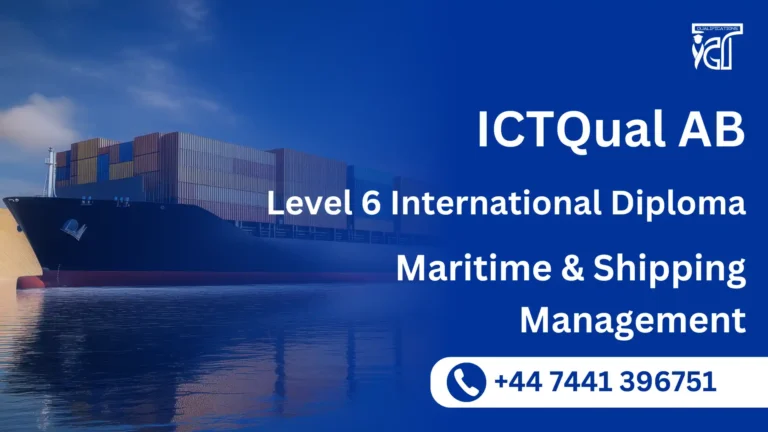The ICTQual AB Level 6 International Diploma in Human Resource Management (HRM) is a comprehensive programme designed to equip learners with advanced knowledge and practical skills in managing human capital effectively. Spanning a three-year duration with a 360-credit structure, this diploma is ideal for both freshers seeking to build a strong foundation in HRM and professionals aiming to enhance their career prospects, take on leadership roles, or specialise in strategic human resource management.
Learners will develop critical competencies in recruitment, talent management, employee engagement, performance appraisal, and organisational development. The programme emphasises both theoretical understanding and practical application, enabling learners to implement effective HR strategies, resolve workplace challenges, and contribute to organisational growth. By fostering leadership, communication, and analytical skills, the course prepares learners to thrive in dynamic business environments and manage diverse teams across industries.
Upon completion, learners can pursue rewarding career opportunities in HR departments, consultancy firms, corporate organisations, government agencies, and multinational companies. The diploma also serves as a solid foundation for those aspiring to specialise further in HR strategy, organisational behaviour, training and development, or pursue higher education in human resource management and related fields.
Key benefits of the programme include a structured learning journey that develops strategic HRM skills, exposure to contemporary HR practices, and preparation for leadership and advisory roles. Learners gain practical expertise, professional credibility, and the confidence required to make informed decisions in complex organisational settings.
This programme is tailored for learners committed to advancing their HRM careers, whether starting afresh or seeking to elevate their existing experience, providing the knowledge, skills, and competence required to excel in today’s competitive organisational landscape.
ICTQual AB Level 6 International Diploma in Human Resource Management (HRM)
This qualification, the ICTQual AB Level 6 International Diploma in Human Resource Management (HRM), consists of 36 mandatory units.
Year 1 – Foundation in Human Resource Management
- Introduction to Human Resource Management
- Principles of Organisational Behaviour
- Fundamentals of Business Management
- Employment Law and Workplace Regulations
- Communication Skills for HR Professionals
- Workforce Planning and Recruitment
- Employee Relations and Workplace Culture
- Diversity, Equity, and Inclusion in HRM
- Fundamentals of Training and Development
- Introduction to Performance Management
- Research Methods in Human Resource Management
- Professional Ethics and Corporate Responsibility
Year 2 – Intermediate Human Resource Management
- Strategic Human Resource Management
- Human Capital Development and Talent Management
- Organisational Learning and Knowledge Management
- Advanced Employee Relations and Negotiation
- Compensation and Benefits Management
- Labour Law and International HR Practices
- Human Resource Information Systems (HRIS)
- Leadership and Team Development
- Conflict Resolution and Workplace Mediation
- Project Management in Human Resources
- Research and Data Analysis for HRM
- Professional Development and Reflective Practice
Year 3 – Advanced Human Resource Management
- Global Human Resource Management
- Strategic Workforce Planning and Analytics
- Advanced Performance Management Systems
- Leadership in Organisational Transformation
- Corporate Governance and HRM Compliance
- International Labour Relations and Policies
- Risk Management and Employee Wellbeing
- HRM in Multinational and Cross-Cultural Contexts
- Innovation and Change Management in HRM
- Sustainable HRM and Corporate Social Responsibility
- Advanced Research in Human Resource Management
- Capstone Project in Human Resource Management
Learning Outcomes for the ICTQual AB Level 6 International Diploma in Human Resource Management (HRM):
Year 1 – Foundation in Human Resource Management
Introduction to Human Resource Management
- Understand the purpose, scope, and functions of HRM.
- Recognise the role of HR in supporting organisational strategy.
- Develop awareness of HRM practices across industries.
Principles of Organisational Behaviour
- Analyse individual and group behaviour within organisations.
- Evaluate factors influencing motivation, teamwork, and leadership.
- Apply behavioural theories to improve workplace performance.
Fundamentals of Business Management
- Understand the core principles of business and management.
- Explore the relationship between HR and wider business functions.
- Apply management concepts in organisational contexts.
Employment Law and Workplace Regulations
- Identify key employment laws and workplace rights.
- Apply compliance requirements to HR practices.
- Understand disciplinary and grievance procedures.
Communication Skills for HR Professionals
- Develop effective verbal and written communication skills.
- Learn conflict-sensitive communication techniques.
- Use digital platforms for professional HR communication.
Workforce Planning and Recruitment
- Understand workforce planning strategies.
- Apply recruitment and selection methods effectively.
- Evaluate modern approaches to attracting and retaining talent.
Employee Relations and Workplace Culture
- Analyse the role of HR in managing workplace relations.
- Promote positive organisational culture.
- Apply strategies to resolve employee issues.
Diversity, Equity, and Inclusion in HRM
- Understand concepts of equity and diversity in the workplace.
- Develop inclusive HR strategies.
- Promote fairness and equal opportunities at work.
Fundamentals of Training and Development
- Understand the learning and development process.
- Design basic training programmes.
- Evaluate the effectiveness of training interventions.
Introduction to Performance Management
- Recognise the principles of performance evaluation.
- Apply appraisal techniques.
- Use performance management as a tool for growth.
Research Methods in Human Resource Management
- Understand qualitative and quantitative research methods.
- Develop skills in data collection and analysis.
- Apply research methods to HR challenges.
Professional Ethics and Corporate Responsibility
- Understand ethical issues in HRM.
- Apply corporate responsibility principles to HR policies.
- Promote integrity and accountability in HR practices.
Year 2 – Intermediate Human Resource Management
Strategic Human Resource Management
- Understand HR’s role in shaping business strategy.
- Analyse the link between HRM and organisational goals.
- Apply models of strategic HRM in practice.
Human Capital Development and Talent Management
- Develop strategies for attracting and retaining talent.
- Understand succession planning.
- Evaluate approaches to human capital growth.
Organisational Learning and Knowledge Management
- Understand learning organisation principles.
- Apply knowledge-sharing practices in HRM.
- Promote innovation through organisational learning.
Advanced Employee Relations and Negotiation
- Analyse complex employee relations issues.
- Apply advanced negotiation strategies.
- Resolve workplace conflicts effectively.
Compensation and Benefits Management
- Understand reward systems and compensation structures.
- Design competitive benefits packages.
- Evaluate the impact of compensation on motivation.
Labour Law and International HR Practices
- Understand international labour law frameworks.
- Compare HR practices across different countries.
- Apply legal requirements in a global context.
Human Resource Information Systems (HRIS)
- Understand the role of HRIS in modern HRM.
- Apply HR technologies for data management.
- Analyse HR data to support decision-making.
Leadership and Team Development
- Understand leadership theories in HR contexts.
- Apply skills for effective team management.
- Develop leadership strategies for workplace success.
Conflict Resolution and Workplace Mediation
- Analyse workplace conflict dynamics.
- Apply mediation techniques.
- Develop policies for conflict management.
Project Management in Human Resources
- Apply project management principles in HR initiatives.
- Plan and implement HR projects.
- Evaluate project outcomes against objectives.
Research and Data Analysis for HRM
- Use data analysis techniques in HR decision-making.
- Apply research tools for organisational improvement.
- Present HR research findings effectively.
Professional Development and Reflective Practice
- Engage in continuous professional growth.
- Apply reflective practice for self-improvement.
- Develop a professional development plan.
Year 3 – Advanced Human Resource Management
Global Human Resource Management
- Understand HR challenges in international organisations.
- Apply strategies for managing global workforces.
- Compare global HRM models and practices.
Strategic Workforce Planning and Analytics
- Use data analytics in workforce planning.
- Forecast workforce needs strategically.
- Apply evidence-based HR decision-making.
Advanced Performance Management Systems
- Evaluate advanced performance management tools.
- Apply continuous performance evaluation.
- Integrate performance management with business strategy.
Leadership in Organisational Transformation
- Understand HR’s role in organisational change.
- Apply leadership strategies for transformation.
- Manage resistance and build adaptability.
Corporate Governance and HRM Compliance
- Understand governance frameworks in HRM.
- Apply compliance requirements in HR functions.
- Promote transparency and accountability in HR policies.
International Labour Relations and Policies
- Analyse international labour standards.
- Apply labour relations strategies globally.
- Understand the impact of global policies on HRM.
Risk Management and Employee Wellbeing
- Identify HR-related risks.
- Apply strategies for workplace wellbeing.
- Integrate wellbeing into HR policies.
HRM in Multinational and Cross-Cultural Contexts
- Analyse cross-cultural HR challenges.
- Apply global HRM strategies.
- Develop skills in multicultural team management.
Innovation and Change Management in HRM
- Understand innovation in HR practices.
- Apply change management models.
- Promote adaptability in HR strategies.
Sustainable HRM and Corporate Social Responsibility
- Apply sustainability principles in HRM.
- Understand HR’s role in CSR initiatives.
- Promote green and ethical HR practices.
Advanced Research in Human Resource Management
- Conduct in-depth HR research projects.
- Apply advanced methodologies.
- Present research findings in a professional manner.
Capstone Project in Human Resource Management
- Integrate knowledge gained across the programme.
- Solve real-world HRM challenges.
- Present a comprehensive HRM project with practical recommendations.
The ICTQual AB Level 6 International Diploma in Human Resource Management (HRM) offers learners a comprehensive set of benefits that enhance both professional expertise and practical skills. By completing this programme, learners develop the knowledge and competencies required to manage human resources effectively, lead teams strategically, and contribute to organisational success. The course ensures learners are well-prepared for diverse HR roles, enabling career growth, practical application, and long-term professional development.
1. Advanced Knowledge in Human Resource Management
- Comprehensive understanding of HR strategies, policies, and procedures.
- Insights into recruitment, talent management, and employee engagement.
- Exposure to performance appraisal systems and organisational development.
- Understanding of contemporary HR challenges and best practices.
- Knowledge of legal and ethical frameworks in HR management.
2. Professional Skill Development
- Enhanced leadership, communication, and team management skills.
- Competence in conflict resolution, negotiation, and employee relations.
- Critical thinking and problem-solving applied to HR scenarios.
- Ability to design and implement HR strategies aligned with business goals.
- Practical skills for HR planning, policy implementation, and decision-making.
3. Career Advancement Opportunities
- Eligibility for roles in HR departments across corporate, public, and non-profit sectors.
- Opportunities in HR consultancy, talent acquisition, and organisational development.
- Preparation for managerial and leadership positions in human resources.
- Pathway to specialisation in areas such as training, HR analytics, or employee relations.
- Enhanced employability and professional recognition in global HR markets.
4. Global Perspective & Networking
- Understanding of international HR practices and cross-cultural workforce management.
- Exposure to global HR policies, labour laws, and compliance standards.
- Opportunities to network with HR professionals and experts worldwide.
- Development of a globally relevant professional outlook.
- Awareness of organisational behaviour and workforce diversity in international contexts.
5. Practical & Transferable Skills
- Ability to conduct HR audits, performance evaluations, and strategic planning.
- Project management and organisational development skills.
- Adaptability to evolving workplace environments and HR technologies.
- Transferable skills applicable across multiple sectors and industries.
- Preparation for lifelong learning and continuous professional development.
The ideal learner for the ICTQual AB Level 6 International Diploma in Human Resource Management (HRM) is someone passionate about developing their expertise in managing people, improving organisational performance, and advancing their HR career. This programme is suitable for fresh learners seeking a solid foundation in human resource management, as well as experienced professionals aiming to enhance their leadership skills, specialise in HR practices, or progress into managerial roles. Learners should be motivated, organised, and eager to develop practical, strategic, and analytical skills that can be applied in diverse workplace contexts.
1. Aspiring HR Professionals
- Individuals seeking to start a career in human resources or personnel management.
- Learners interested in recruitment, talent management, and employee engagement.
- Those aiming to develop strong organisational and people management skills.
- Individuals preparing for further studies or certifications in HRM.
- Learners motivated to establish a professional foundation in HR practices.
2. Current HR Practitioners & Managers
- Professionals looking to enhance strategic HRM knowledge and leadership skills.
- Those aiming to move into senior HR or managerial roles.
- Learners seeking to improve team performance and employee relations.
- Individuals responsible for policy implementation, compliance, and workforce planning.
- Those striving for professional recognition and credibility in HRM.
3. Fresh Graduates & Career Changers
- Recent graduates interested in entering the HR profession.
- Individuals transitioning from other fields seeking HR expertise.
- Learners eager to gain practical and transferable skills for career readiness.
- Those looking for structured guidance through a recognised HRM programme.
- Individuals committed to building knowledge and confidence in HR management.
4. Global HR & Workforce Enthusiasts
- Learners interested in cross-cultural workforce management and international HR practices.
- Professionals seeking knowledge of global HR policies, labour laws, and compliance.
- Individuals aiming to work in multinational organisations or global HR teams.
- Those keen on networking with HR experts and understanding workforce diversity.
- Learners motivated to develop a globally relevant HR perspective.
5. Lifelong Learners & Skill Developers
- Individuals committed to continuous professional and personal growth.
- Learners passionate about strategic planning, organisational development, and employee performance.
- Those keen to enhance problem-solving, analytical, and decision-making skills.
- Professionals aiming to adapt to evolving workplace trends and HR technologies.
- Learners seeking practical, transferable skills to thrive in diverse industries.
Completing the ICTQual AB Level 6 International Diploma in Human Resource Management (HRM) equips learners with the knowledge, skills, and credibility to pursue advanced career opportunities, leadership roles, and further academic progression in the HR field. The programme ensures learners are prepared to contribute strategically to organisational growth and manage workforce challenges effectively.
1. HR Management & Leadership Roles
- Eligibility for managerial and senior HR positions in corporate, public, and non-profit sectors.
- Opportunities to lead recruitment, talent development, and employee engagement initiatives.
- Roles in workforce planning, HR strategy, and organisational development.
- Advancement into HR director or leadership positions within organisations.
- Preparation for decision-making and strategic HR leadership responsibilities.
2. Human Resource Consultancy
- Careers in HR advisory and consultancy services.
- Opportunities to support organisations in policy development, compliance, and workforce optimisation.
- Roles in change management, organisational restructuring, and HR audits.
- Engagement with clients on HR strategies and employee relations solutions.
- Development of expertise for independent HR consultancy practice.
3. Training & Organisational Development
- Specialisation in employee training, learning, and development programmes.
- Roles in coaching, mentoring, and skill enhancement initiatives.
- Opportunities in talent management and succession planning.
- Contribution to organisational culture, productivity, and performance improvement.
- Career pathways in corporate learning, HR development, and leadership training.
4. Higher Education & Academic Progression
- Pathway to postgraduate studies such as Master’s or MBA in HRM or related fields.
- Specialisation in strategic HRM, organisational behaviour, or HR analytics.
- Opportunities for research, teaching, and academic publications in HR.
- Access to scholarships, fellowships, and international study programmes.
- Strengthened credentials for professional and academic recognition.
5. Global & International HR Opportunities
- Careers in multinational organisations and international HR teams.
- Roles in cross-cultural workforce management, compliance, and global HR policies.
- Opportunities in international HR consultancy and advisory roles.
- Engagement with global HR networks and professional organisations.
- Development of skills to manage diverse, geographically distributed teams.
As an approved centre of ICTQual AB, we provide learners with two structured pathways to achieve the Level 6 International Diploma in Human Resource Management (HRM).
Route 1: Experienced Professionals
- Eligibility: Learners must have at least six years of verifiable experience in human resources, organisational management, or related sectors.
- Focus: Advanced HR modules, strategic projects, and applied learning tailored to experienced professionals.
- Benefits: Enhances leadership, analytical, and decision-making skills while building on existing expertise.
- Outcome: Prepares learners for senior HR, managerial, and advisory roles.
- Learning Approach: Streamlined programme recognising prior knowledge and professional experience.
Route 2: Fresh Learners
- Eligibility: Designed for learners new to HR or with limited professional experience.
- Focus: Structured learning through 36 assignments covering all key HR principles and practical applications.
- Benefits: Builds foundational knowledge in HRM, employee management, and organisational strategy.
- Outcome: Prepares learners for entry-level and junior HR roles with strong practical skills.
- Learning Approach: Step-by-step guidance to develop knowledge, confidence, and competence in HR practices.
Entry Requirements
To enrol in the ICTQual AB Level 6 International Diploma in Human Resource Management (HRM), learners must meet the following entry requirements to ensure readiness for the programme’s academic and professional rigour:
Minimum Age
- Learners must be 18 years or older at the time of enrolment.
- Ensures maturity and readiness for advanced studies and professional engagement in HR.
Educational Background
- Completion of secondary education (high school) or an equivalent recognised qualification.
- Preferably, a Level 5 diploma or equivalent in HRM, business management, or related disciplines for advanced preparation.
- Fresh learners without prior diplomas can enrol via the assignment-based pathway.
Experience
- Route 1 (Experienced Professionals): Minimum six years of verifiable experience in HR, organisational management, or related sectors.
- Route 2 (Fresh Learners): No prior experience required; learners complete 36 structured assignments to gain core competencies.
Language Proficiency
- Learners must demonstrate proficiency in English, as the programme is delivered entirely in English.
- Acceptable evidence includes:
- Prior education in English
- IELTS score of 5.5 or above, or equivalent
- Other recognised English language certifications
- Strong written and verbal communication skills are essential for completing assignments and engaging in academic discussions.
Register Now
Qualification Process
Qualification Process for the ICTQual AB Level 6 International Diploma in Human Resource Management (HRM)
- Self-Assessment:
Begin by evaluating your eligibility to ensure you meet the qualification requirements, including work experience, knowledge, and language proficiency. - Registration:
Complete your registration by submitting the required documents, including a scanned copy of a valid ID, and paying the registration fee. - Induction:
An assessor will conduct an induction to confirm your eligibility for the course and explain the evidence requirements. If you do not meet the criteria, your registration will be cancelled, and the fee will be refunded. - Assignments & Evidence Submission:
Provide all assignments and the necessary evidence based on the assessment criteria outlined in the course. If you are unsure of the required evidence, consult with the assessor for guidance on the type and nature of evidence needed. - Feedback and Revision:
The assessor will review your submitted evidence and provide feedback. Evidence that meets the criteria will be marked as “Criteria Met,” while any gaps will be identified. You will be asked to revise and resubmit if needed. - Competence Evidence:
Submit final evidence demonstrating that all learning outcomes have been met. This evidence will be marked as “Criteria Met” by the assessor once it is satisfactory. - Internal Quality Assurance (IQA):
The Internal Quality Assurance Verifier (IQA) will review your evidence to ensure consistency, quality, and compliance with standards. - External Verification:
The IQA will submit your portfolio to ICTQUAL AB External Quality Assurance Verifiers (EQA) for final confirmation. The EQA may contact you directly to verify the authenticity of your evidence. - Certification:
Upon successful completion of all checks, ICTQUAL AB will issue your official certificate, confirming that you have attained the ICTQual AB Level 6 International Diploma in Law & Legal Studies.







